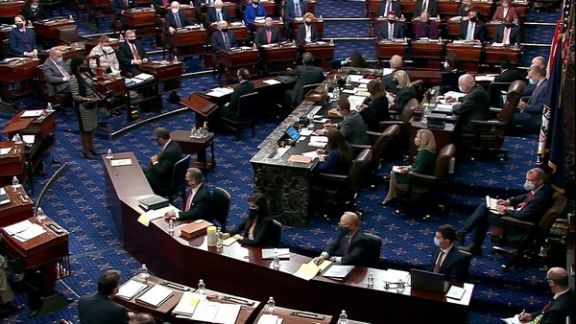New Senate Act Could Stop Biden Lifting Iran Sanctions

Senate Republicans have introduced a legislative measure that would make it extremely difficult for the Biden administration to lift economic sanctions imposed on Iran.

Senate Republicans have introduced a legislative measure that would make it extremely difficult for the Biden administration to lift economic sanctions imposed on Iran.
The new legislative effort, called the PUNISH Act, comes in the wake of the controversial ‘prisoner swap’ deal in August for which the administration released $6 billion of Iran’s frozen oil revenues blocked in South Korea and another $2.7 billion from Iraq.
The PUNISH Act takes away the President’s executive authority to lift economic penalties until the administration can show that the Islamic Republic and its affiliated groups in the region have ceased all attempts to assassinate American officials, citizens, and Iranian nationals in the United States.
“President Biden’s strategy of appeasement continues to risk the lives of Americans at home and abroad,” said Sen. Joni Ernst, introducing the Act, “Iran cannot be allowed to continue to attempt to kill US citizens and Iranian dissidents with impunity."

The Biden administration seems to be desperate to find a nuclear deal with Iran and is therefore willing to look away when the regime kills Iranian protesters or sells oil that is supposed to be sanctioned, some critics say.
“My PUNISH Act will put an end to this failed appeasement strategy and ensure Iran feels the maximum consequences of their actions from the United States,” Sen. Ernst said Thursday.
Critics in both Houses have warned the Biden administration that money made available to the regime in Iran would likely be used for more destabilization outside the country and more oppression inside.
Rep. Jim Banks –who introduced the MAHSA Act– highlighted this in a post on his account on X (Twitter), one day after news broke that yet another young girl had been beaten for not covering her hair and was now in critical condition.
“This sort of brutality will continue until Congress holds the Iranian regime accountable,” wrote congressman Banks, “The Senate must take up and pass my MAHSA Act now!
Iranian activists on social media were more direct and more pronounced in their criticism. Dozens bombarded the account of the Office of the Special Envoy for Iran, after it expressed concern and shock at the report.
“What exactly shocked you?!,” wrote one, “the way they’ve used your 6 billion to kill us? You stood by the Islamic Republic in all these crimes.”
https://twitter.com/justchangingun/status/1709706197295653093
The “$6 billion” has become a central part of most criticisms leveled at the Biden administration since its ‘prisoner swap’ deal.
The PUNISH Act seems to be a reaction to that deal. It has to be understood in the context of a broader pushback against Biden’s Iran policy. The administration negotiating with Iran since April 2021 with the declared aim or reviving the 2015 JCPOA nuclear agreement, while relaxing the enforcement of US sanctions. The result has been a surge in Iranian oil exports and a dangerous escalation of it nuclear program.
UN's nuclear watchdog, the International Atomic Energy Agency, estimates that Iran has enough enriched uranium to produce five nuclear bombs, a capability it did not have before Joe Biden was elected President.
Section 8 of the Act reads: “the President may not waive, suspend, reduce, provide relief from, or otherwise limit the application of sanctions imposed pursuant to any covered provision of law.”
The legislation states clearly that sanctions may only be lifted if the State Department certifies that Iran has refrained from supporting or attempting assassination or kidnappings for five continuous years. Lawmakers are also demanding classified briefings on Iran's ongoing assassination plots against US officials and citizens, emphasizing the need to ensure their safety and hold Iran accountable.
Given the Islamic Republic’s persistent pursuit of such actions and ongoing threats against American citizens and dissidents abroad, it is unlikely that the Biden administration can provide such a certification of compliance, assuming that the legislation is enacted into law.